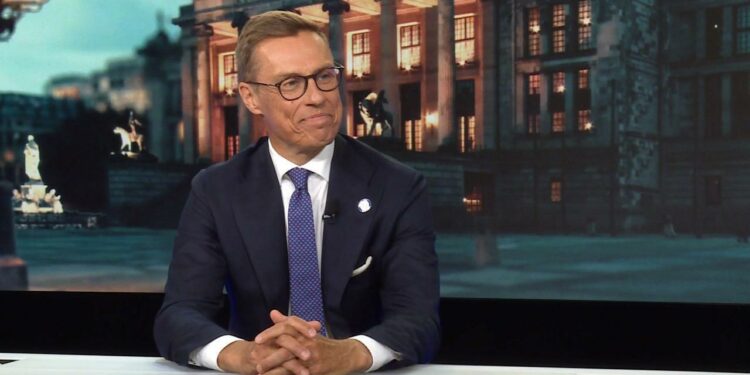Issued on: 26/07/2024 – 18:10
This week’s guest on Talking Europe has a unique vantage point on both the world of politics and sports. Alexander Stubb, the president of Finland, has been an established and influential figure in European and global affairs for the past decade. He’s also a keen sportsman, competing – and winning titles – in triathlon, even during his political career.
While in Paris, Stubb is taking the opportunity to attend a number of Olympic events and cheer on his Finnish compatriots. But this year’s Games have been overshadowed by geopolitics, with conflicts raging between Russia and Ukraine, as well as in the Middle East. For Stubb, even the much-reduced number of Russian athletes competing at the Paris Games is too much. He says: “A lot of Russians are now understanding ‘why we are not in the Olympics’. So I hope that this puts pressure on Russia and Putin to stop this completely senseless war. If it was up to me, there would be no Russian athletes here. You have to pay the price.”
It’s not the first time, of course, that politics has competed with sports on the global scene. As Stubb points out, the Games are also an opportunity to put conflict to one side, and potentially build bridges with adversaries. “Politics is part of the Olympics,” he says. “There’s nothing you can do about it. It wants to brand itself as a peace movement. When I’m here, I meet about 140 heads of state and government from all around the world. So it’s a good opportunity to have a few battles on the track and field, nowhere else.”
As president of Finland, Stubb’s main domain of responsibility is foreign affairs. Finland finally joined the Alliance last year, a move that Stubb supported despite domestic opposition. He explains: “I’ve been an advocate of Finnish NATO membership for the better part of 30 years. I was in a quite distinct minority”.
Given the current geopolitical situation – particularly the menace posed by Russia, with which Finland shares a 1,300 kilometre-long border and centuries of tense relations – Stubb believes that NATO membership is beneficial to both Finland and the Alliance. “Finland is safer and I think the Alliance is safe. Remember that we have one of the largest militaries in Europe. We just doubled NATO’s border with Russia. We still have obligatory military service. We have 900,000 men and women that have done military service. So we’re a very safe pair of hands. Because of the size of our military, we are a mid-sized power in the Alliance. People expect a lot from us, but it is quite clear that Russia now sees us very much on the enemy side because we joined NATO. But I actually think that we are very much in a position of strength.”
Of course, the destiny of NATO is inextricably linked to the United States – and the outcome of the US election in November. Finland’s president underlines that Donald Trump did have an impact on NATO, especially when it came to ensuring each NATO member pulled their weight. “Trump … we always talk about him being so harsh on NATO, but he actually forced many of the allies to reach a 2 percent threshold of GDP in defence expenditure, because in 2014, there were only three countries reaching that level in the allies in the Alliance, and now it’s 23.” Stubb adds that, whoever eventually wins the US election, he expects them to maintain strong ties with Europe, noting that “America wants to be the number one superpower in the world. And in order for it to be so, it needs allies. And those allies come here from here”.
For the Finnish president, international cooperation is vital to push for an end in the Ukraine conflict – a prospect he considers is closer now than in the past. “We’re moving slowly towards peace. I was at the peace forum in Switzerland a few weeks back. Now we’re seeing President Zelensky starting to talk about Russia being involved in the peace process as well. I think we need to get the Chinese involved. We need to do this together”. However, the EU has struggled to impose a united front of late, with the EU institutions reacting angrily following a recent so-called Peace Tour conducted by Hungarian Prime Minister Viktor Orban. With Hungary adopting the rotating Presidency of the Council of the EU this July, Orban visited Kyiv and Moscow, as well as Beijing and the US – adding an additional voice to the chorus of European diplomacy. For Stubb, “if you hold the presidency of the European Union, you are in no position to visit Moscow without the consent of others. […] There’s no space for Orban-like solo moves”.
Finally, Finland sits in an interesting position regarding the rise of populist politics and politicians in Europe. Since last year, its government has included a right-wing populist movement, the Finns’ Party. But during the European elections of this year, the pendulum swung the other way, with moderate parties sending a majority of MEPs from Finland to Brussels. Stubb, who has been a student of European politics for at least three decades, sees cause for measured optimism that the EU can push back. “The forces of regional integration are stronger than the forces of global integration,” he says. “So I predict that the European Union is going to continue to be strong and steadfast. Remember, it’s never perfect.”
Somewhat wryly, Finland’s president outlines his vision for how the EU functions. “You go through three phases. First, you have a crisis, then you have chaos. And eventually you get a suboptimal solution.”
Source link : https://www.france24.com/en/tv-shows/talking-europe/20240726-finland-s-stubb-if-it-was-up-to-me-there-would-be-no-russian-athletes-at-olympics
Author :
Publish date : 2024-07-26 07:00:00
Copyright for syndicated content belongs to the linked Source.




